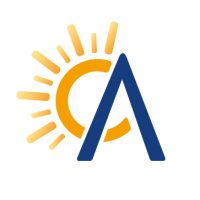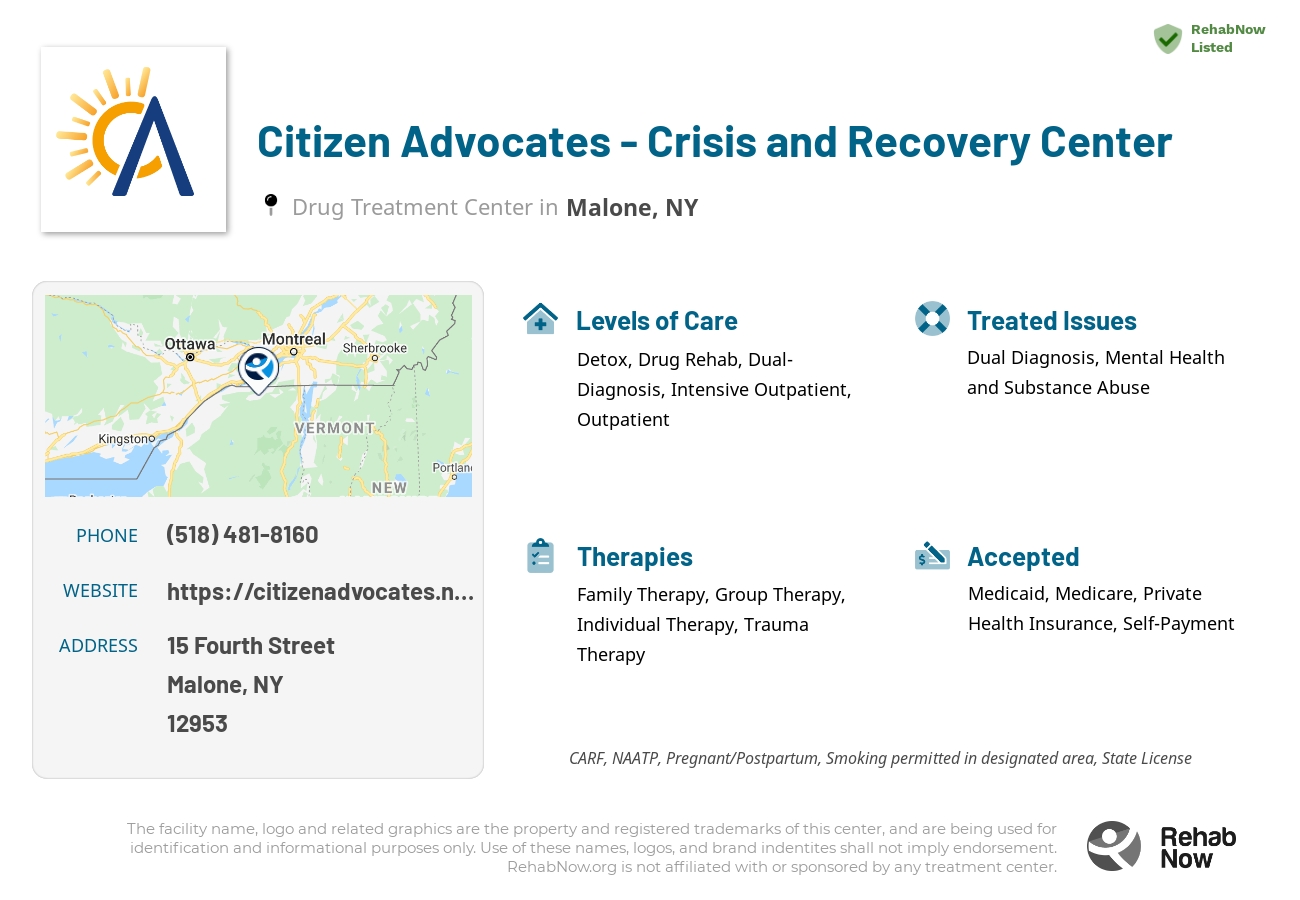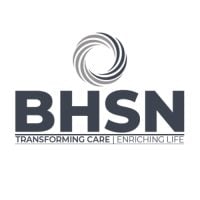Citizen Advocates - Crisis and Recovery Center
Drug Rehab Center in Malone, New York
Citizen Advocates - Crisis and Recovery Center offers a comprehensive range of treatment programs that include detoxification, Inpatient, Intensive Outpatient, Outpatient and Aftercare Support Levels of Care, with personalized plans based on individual needs and evidence-based practices.
About Citizen Advocates - Crisis and Recovery Center in New York
Citizen Advocates - Crisis and Recovery Center is a highly reputable Addiction Treatment Facility located in Malone, NY. This center specializes in providing comprehensive care for individuals suffering from Dual Diagnosis, Drug Addiction, and Mental Health disorders. With a range of treatment options available, Citizen Advocates is dedicated to helping individuals navigate their journey to sobriety and improved mental well-being. They offer various levels of care, including Detox, Drug Rehab, Dual-Diagnosis treatment, Intensive Outpatient programs, Outpatient services, Inpatient care, and Aftercare Support. Moreover, Citizen Advocates accepts Private Health Insurance, making their services accessible to those with insurance coverage. Affiliated with Citizen Advocates, individuals can trust that they will receive top-notch care from highly qualified and experienced professionals.
At Citizen Advocates - Crisis and Recovery Center, individuals can expect a comprehensive array of services and treatment methods aimed at addressing addiction and substance abuse issues. Their team of dedicated professionals provides a personalized approach to treatment, tailoring plans to meet each individual's unique needs. With a focus on Dual Diagnosis, the center recognizes the importance of addressing underlying mental health disorders alongside addiction. Their specialized Dual-Diagnosis treatment approach provides integrated care to address both aspects simultaneously. Additionally, Citizen Advocates offers detoxification services for those in need of a safe and supportive environment during the withdrawal process. Their Drug Rehab programs provide a structured and therapeutic environment for individuals to work on their recovery journey. Beyond the initial treatment phase, Citizen Advocates offers Intensive Outpatient and Outpatient programs to support individuals as they transition back into their daily lives. With a commitment to long-term recovery, the center also provides Aftercare Support to help individuals maintain their sobriety and navigate any challenges that may arise. Through a blend of evidence-based therapies, counseling, and support services, Citizen Advocates empowers individuals to overcome addiction and achieve lasting recovery.
Genders
Ages
Modality
Additional
Conditions and Issues Treated
A “dual diagnosis” is when the individual has two medical issues at the same time. The top co-occurring mental disorders with addiction are depression, anxiety, ADHD, bi-polar disorder. Addiction is also considered a mental illness that is not a choice but rather a medical condition. Addiction can be caused by any number of underlying issues.
Dual diagnosis is provided by Citizen Advocates - Crisis and Recovery Center to treat addictive tendencies as well as any untreated mental illnesses. This ensures successful long term health and recovery for patients after treatment has been completed.
Dual diagnosis is provided by Citizen Advocates - Crisis and Recovery Center to treat addictive tendencies as well as any untreated mental illnesses for people in New York. This ensures successful long term health and recovery for patients after treatment has been completed.Levels of Care Offered
This center offers a variety of custom treatment tailored to individual recovery. Currently available are Aftercare Support, Detox, Drug Rehab, Dual-Diagnosis, Inpatient, Intensive Outpatient, Outpatient, with additional therapies available as listed below.
The first level of recovery is detox. It involves giving a person the opportunity to get the toxins out of their body safely. The individual receiving treatment at Citizen Advocates - Crisis and Recovery Center typically will get ill during detox, and they will often start using again to get rid of unpleasant emotions and complicated physical responses. It is why having a New York medical professional present is so critical. A medical professional can make sure that patients do not start using again during detox and stay physically healthy during the process. They will also have treatment on a mental level to relieve their symptoms and guide them through the process.
Going to an inpatient rehab facility means living there while all aspects of addiction or co-occurring disorder get addressed. The treatment involves medical supervision, therapy, and future planning.
This type of rehabilitation provides a drug-free environment for people who struggle with chronic/long-term addiction without having access to drugs outside the center (or their own home). It takes away any distractions because they live there 24 hours per day. If someone is trying to break out old habits, which could lead them back into substance abuse, things like jobs or school can be put on hold until after they complete their stay to focus solely on recovery.
Outpatient addiction treatment is beneficial for people who are able to function well in their day-to-day lives. It is recommended for people who are not yet ready to end their relationships with friends or family members who might be encouraging drug and alcohol use.
Intensive outpatient treatment is beneficial for:
- People who are able to attend treatment more than 3 times per week.
- People who do not meet the criteria for inpatient treatment.
- People who are able to contribute to their own recovery outside of the treatment center.
- People who are motivated towards recovery.
- People who are able to overcome addiction on their own without the need for higher levels of care.
Outpatient programs at Citizen Advocates - Crisis and Recovery Center, the Malone resident can live with their family while continuing with their job or studies. Treatment includes educating the patient on drug abuse, medications, and counseling sessions at the individual or group level. Outpatient treatment plans cover diagnosis, detoxification, management, and counseling. They are a popular option for those who have graduated from inpatient facilities.
Without aftercare support, addicts can easily relapse back into addiction. It is crucial to integrate the addict back into society. Aftercare support should take place after outpatient treatment has ended.
There are a few different types of aftercare support that patients can seek after completing an inpatient treatment program:
- 12 Step Self-help groups (AA, NA)
- Therapeutic communities,
- Long-term, structured sober living arrangements
- Halfway houses (residential treatment centers)
Many different support groups exist for addicts to seek help after treatment. Some are more effective than others, depending on the person’s addiction, background, and other factors.
Therapies & Programs
Individual therapy is a form of counseling where you meet with a trained professional one-on-one. Meeting with a therapist in this setting allows for a personal and trusting relationship to be built. This allows the patient to open up about sensitive or private issues they may not feel comfortable discussing in a group. Individual therapy helps identify the root causes of your addiction, which can help prevent relapse.
Couples therapy for drug addiction is a unique form of therapy that allows family members to work through the emotional issues of their loved one’s addiction together. Family members can support each other while learning how to cope with the addiction and encourage healthy changes. The two will work with a therapist to learn how the addiction affects themselves and the relationship.
Family therapy is often done alongside drug treatment to help addicts stay sober. The goal of family therapy for drug addiction is to create an environment where communication can happen without judgment, hostility, or blame. The therapist will sit with the family so they can learn how to communicate differently and provide new tools for dealing with emotions so that people don’t want to drink or do drugs. It’s important for families to focus on relapse prevention plans during treatment so that if the addict feels like they want to use again, they’ll know what steps they need to take together to prevent it from happening again in the future.
Group therapy sessions are another common addiction recovery service. These group sessions typically involve six to 12 addicts who meet regularly with a trained professional for support and guidance.
During these sessions, the group shares their experiences with one another and provides feedback that can help each member avoid relapse or overcome specific obstacles they are facing in their recovery process. With this type of support and guidance, addicts can feel like they are part of a community that understands their struggles and will help them get through the hard times.
Many people struggling with drug addiction have experienced some form of trauma in their lives. It is crucial that these individuals seek out professional help; otherwise, their drug abuse and addiction will likely continue.
Therapists and counselors at drug treatment centers employ several treatment programs to help people struggling with drug addiction, including trauma therapy. Trauma therapy helps people dealing with addiction by allowing them to confront the traumas of their past and move past them.
It is important to note that trauma therapy should not be confused with PTSD (post-traumatic stress disorder). Rather, it is used to treat the effects of trauma, which are often at the root of addiction.
Dialectical Behavior Therapy was developed in the 1980s to treat chronically suicidal individuals. It is a cognitive-behavioral therapy that combines standard DBT with strategies derived from Zen Buddhism, such as mindfulness training.
DBT has been adapted for use with other types of psychiatric problems, including eating disorders, substance abuse disorders, borderline personality disorder, posttraumatic stress disorder (PTSD), and other personality disorders. Dialectical Behavior Therapy is considered a psychosocial treatment of BPD. This means that while it can be used alone or in conjunction with drug treatments, DBT does not rely on medications to treat the disorder. Instead, DBT aims to help patients change their thinking and behavior.
Cognitive Behavioral Therapy (CBT) focuses on the underlying thoughts and behaviors that caused the problem of addiction in the first place and may cause a relapse. Negative feelings are common in drug abuse disorders, but they can lead to co-occurring disorders if not recognized. CBT involves strategies that help to change the behavior pattern by restructuring negative thoughts into positive ones. It helps to remove these feelings, and it provides long-term benefits. Also, CBT promotes self-awareness and self-control. It can be administered as a monotherapy or as part of combination therapy.
CBT can improve the patient’s mood, reduce drug cravings and boost success rates on treatment plans. Regular practice can help individuals handle negative attitudes, thoughts, and feelings without turning to drugs or alcohol. The core belief of Cognitive Behavioral Therapy (CBT) is that one’s moods, behaviors, and actions are all connected. Individuals can improve their quality of life using CBT. It helps addicts understand the patterns of thought and feelings that cause them to use drugs or alcohol and develop a healthy response.
Eye Movement Desensitization and Reprocessing (EMDR) therapy is a treatment method that helps reduce the impact of traumatic memories on individuals. It involves following a bar of light or watching a therapist’s finger move back and forth. This mimics the eye movements of REM sleep, which allows the brain to reprocess memories. EMDR therapy is combined with behavioral therapies to address the root cause of the problem. This reduces the desire to escape painful memories with drugs.
EMDR can be helpful for people who turn to drugs to escape traumatic events. It is a treatment that reduces the impact these memories have on emotions. Individuals who suffer from negative feelings associated with a traumatic experience can find relief in EMDR therapy. This treatment is combined with behavioral therapies. Patients follow a bar of light throughout the session or watch their therapist’s finger move back and forth. These rapid eye movements reduce feelings of negativity and promote calmness and relaxation. This minimizes the impact traumatic memories have on emotions, reducing the desire to escape painful memories with drugs.
It’s not as simple as quitting drinking or using drugs and expecting the hard part to be over. Many addicts in recovery have discovered that they need to improve skills such as time management, organization, communication, socialization, and self-esteem. Learning certain life skills can help those who are struggling with addiction.
Payment Options Accepted
For specific insurance or payment methods please contact us.
Is your insurance accepted?
Ask an expert, call (888) 674-0062
Citizen Advocates Associated Centers
Discover treatment facilities under the same provider.
- Citizen Advocates - North Star Behavioral Health - Malone in Malone, NY
- Citizen Advocates - Behavioral Health Clinic in Massena, NY
- ADAC - The Alcohol and Drug Abuse Council of Delaware County in Delhi, NY
Learn More About Citizen Advocates Centers
Additional Details
Specifics, location, and helpful extra information.
Malone, New York 12953 Phone Number(518) 481-8160 Meta DetailsUpdated November 25, 2023
Staff Verified
Citizen Advocates - Crisis and Recovery Center Patient Reviews
There are no reviews yet. Be the first one to write one.
Malone, New York Addiction Information
More than 2 million New Yorkers are currently suffering from some type of substance abuse and many of those are minors. Alcohol abuse, in particular, is prevalent among those underage. As a result of the high prices and regulation of prescription drugs, many New Yorkers turn to heroin instead. This has led to a serious heroin epidemic in the state.
Malone, New York has seen an increase in addiction and abuse problems in recent years. There are many treatment options available for those struggling with addiction. Inpatient rehab is a residential treatment program where patients live at the rehab center for the duration of their treatment. 12-step programs are self-help programs that are based on Alcoholics Anonymous.
Treatment in Nearby Cities
- Peekskill, NY (247.4 mi.)
- Haverstraw, NY (253.7 mi.)
- Albion, NY (223.7 mi.)
- Farmington, NY (198.3 mi.)
- North Collins, NY (280.1 mi.)
Centers near Citizen Advocates - Crisis and Recovery Center
The facility name, logo and brand are the property and registered trademarks of Citizen Advocates - Crisis and Recovery Center, and are being used for identification and informational purposes only. Use of these names, logos and brands shall not imply endorsement. RehabNow.org is not affiliated with or sponsored by Citizen Advocates - Crisis and Recovery Center.











